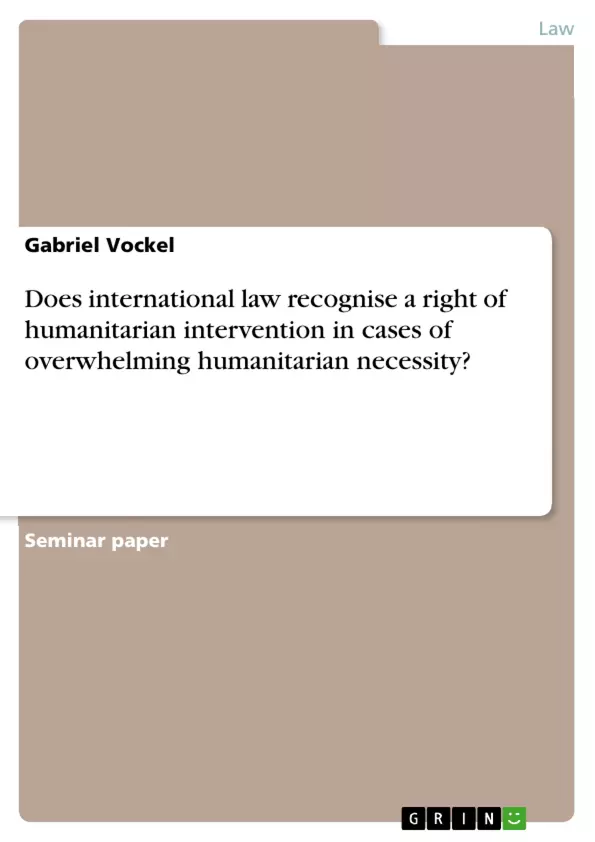The dilemma of what to do about citizens of another sovereign country who see themselves confronted with horrifying abuses by their own government has remained with us throughout the era post World War II. The recent events in the Sudanese region of Darfur, labelled not only civil war, but “ethnic cleansing” have, again, triggered discussions about the question of “humanitarian intervention”. We can quote various instances in recent history after 1945, where appalling violations of basic human rights, including the mass killing of civilians on a high scale happened within the sovereign territory of a country, for example in Cambodia in the period 1975-1979, in Ex-Yugoslavia in the early 1990s, in Rwanda in 1994, to name but these.3Time and again, alongside those tragic events, different voices have called for military actions driven by humanitarian considerations, seemingly subscribing to the catchphrase “humanitarian intervention [as opposed to] inhumanitarian non-intervention”. The military actions of NATO in Kosovo especially, having been branded the first “humanitarian war”, have attained a remarkable degree of attention in the academia, raising new and old questions about the legitimacy and viability of the model of humanitarian intervention. While there seems to be an unanimous agreement that there are in existence both moral and ethical raisons d’être as well as some agreement of how the modus operandi of a humanitarian intervention should look like10, there exists some substantial disagreement as to if at all and under which conditions such a venture is to be deemed legally permissible.
In the face of an absence of a comprehensive legalistic framework under international law that would govern humanitarian interventions (the human rights framework is severely limited by the weaknesses of its enforcement mechanisms), the essence of the contemporary debate predominantly stems from a clash of imperatives between the principles of the protection of state sovereignty as laid down in Art. 2 (4) and (7) of the UN-Charter and the obligation of the protection of human rights (that might be achieved through a humanitarian intervention), in other words, a “conflict between justice and [legal] order”.
Inhaltsverzeichnis (Table of Contents)
- Introduction
- The Analysis of the subject matter
- I.) Analysis of relevant articles of the UN-Charter
- II.) Analysis of contemporary rules of customary international law
- III.) Potential emergence of a customary right to humanitarian intervention under conditions
- Conclusion
Zielsetzung und Themenschwerpunkte (Objectives and Key Themes)
This paper examines the concept of humanitarian intervention within the framework of international law. It aims to analyze the relevant provisions of the UN Charter and the emerging rules of customary international law to determine whether there exists a legal right of humanitarian intervention. The paper focuses on the tension between the principle of state sovereignty and the obligation to protect human rights, exploring the arguments for and against the legitimacy of humanitarian intervention.
- The legal and ethical implications of humanitarian intervention
- The tension between state sovereignty and the protection of human rights
- The analysis of relevant provisions of the UN Charter
- The role of customary international law in regulating humanitarian intervention
- The potential emergence of a customary right to humanitarian intervention
Zusammenfassung der Kapitel (Chapter Summaries)
- Introduction: The paper introduces the debate surrounding humanitarian intervention, highlighting the historical context and providing a definition of the concept. It emphasizes the recurring dilemma of addressing human rights abuses within sovereign states, particularly in light of recent events such as the Darfur crisis.
- The Analysis of the Subject Matter: This section delves into the legal framework surrounding humanitarian intervention. It explores the relevant articles of the UN Charter, including the prohibition on the use of force, and analyzes the potential for a customary right to humanitarian intervention based on state practice.
Schlüsselwörter (Keywords)
The paper focuses on key terms such as humanitarian intervention, international law, UN Charter, state sovereignty, human rights, customary international law, de lege lata, de lege ferenda, and the potential emergence of a customary right to humanitarian intervention.
Frequently Asked Questions
What is humanitarian intervention in international law?
It refers to military action taken by a state or group of states within another sovereign state, driven by the need to prevent overwhelming human rights abuses like genocide or ethnic cleansing.
How does the UN Charter view humanitarian intervention?
The Charter generally protects state sovereignty (Art. 2(4) and 2(7)), creating a conflict between the principle of non-intervention and the obligation to protect human rights.
What was the significance of the NATO intervention in Kosovo?
Branded as the first "humanitarian war," it raised significant questions regarding the legal permissibility of interventions without explicit UN Security Council authorization.
Is there a customary right to humanitarian intervention?
The paper analyzes whether a customary right is emerging (de lege ferenda) based on state practice, despite the absence of a comprehensive legal framework (de lege lata).
What is the "conflict between justice and legal order"?
It refers to the dilemma where moral/ethical reasons for intervention conflict with the existing legal rules of state sovereignty and the prohibition of the use of force.
- Quote paper
- Master of Arts in Diplomacy, Law and Global Change Gabriel Vockel (Author), 2005, Does international law recognise a right of humanitarian intervention in cases of overwhelming humanitarian necessity?, Munich, GRIN Verlag, https://www.grin.com/document/66212



